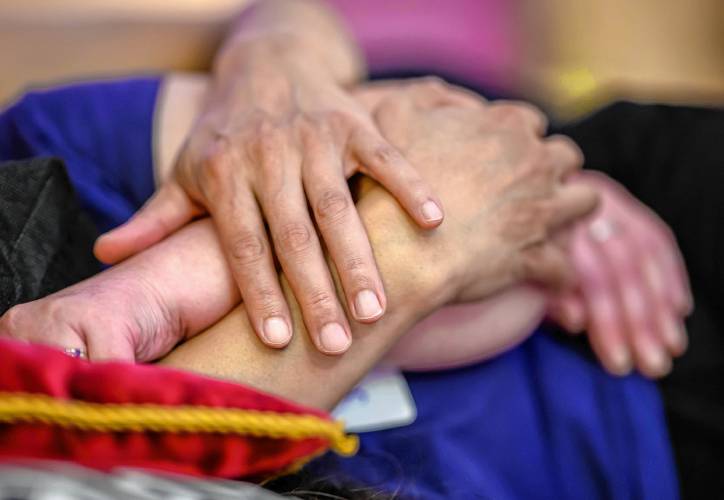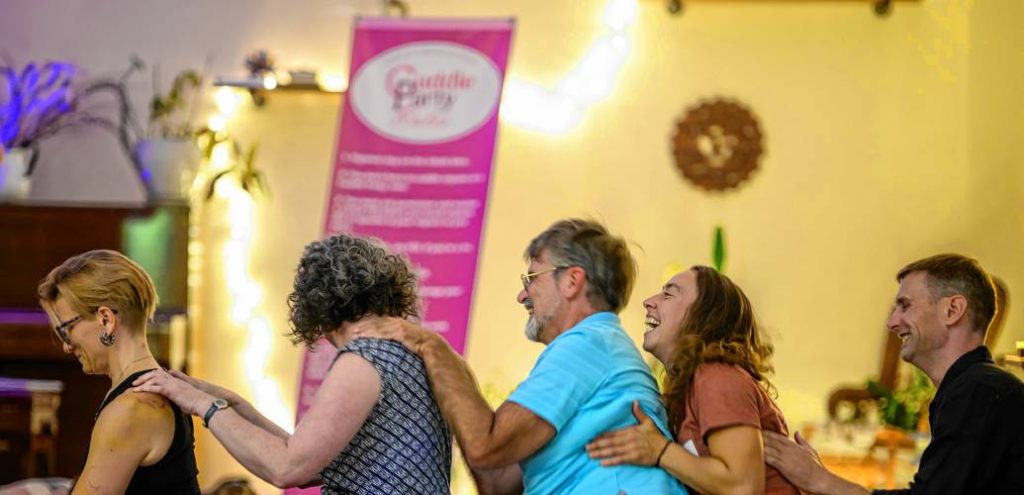By MELISSA KAREN SANCES
For the Advocate
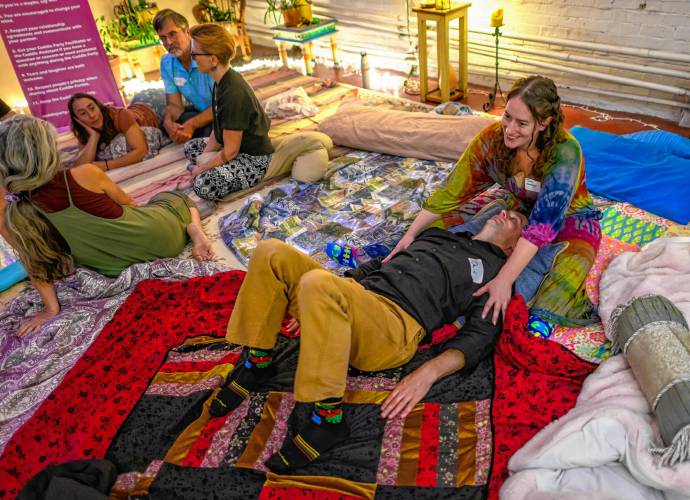
Cuddle Party attendees, from left, Lorelie, Phy, Chris, Ray, David and Julia, relax during a recent event in Florence. PHOTO BY CHRISTOPHER EVANS
As the sun sets over the Hidden Temple in Florence, 14 adults in their comfiest pajamas sprawl on a generous bed of quilts. Outside on this crisp October Saturday, the foliage is just starting to turn, its pops of color complementing the painted columns inside the spacious industrial building. Fairy lights twinkle in the corner. Pillows abound.
The event facilitator, Doug Pouliot, asks everyone to assemble in a circle. Sitting cross-legged with a thick, white binder in his lap, he holds up a small wooden instrument that he strikes lightly, introducing it as his “interrupting frog,” a sort of gong that will keep loose time. Running his fingers though his long grey hair, he opens the binder and begins.
“Why am I at Cuddle Party?” he asks. “For two years during COVID I realized I didn’t get touched. My cat just wasn’t doing it for me.”
People smile in recognition.
The facilitator, who lives in Windsor, Connecticut but frequently hosts events in Florence, explains to the veterans and first-timers here that a Cuddle Party is a communication and consent workshop. (Cuddle Parties originated in New York in 2004; today there are more than 150 certified facilitators worldwide, including five in Massachusetts, according to their website.)
“The consent part of this can be draining,” he admits. “It can feel like I have to hold myself together because I’m waiting to actually touch people.” More smiles. But Pouliot, who attended his share of parties before becoming a host, says learning to ask for what he needed was critical to finally getting what he wanted.
Yes and No
As they introduce themselves, some participants share lingering questions. “As a woman, so much of my life is, is this person hugging me to hug me, or to get farther?” says Julia Klebanov, who traveled here from Southbridge. A man who wishes to remain anonymous says he recently realized how uncomfortable he was with touch, “and I wondered what has changed.” As people become more vulnerable verbally, there is a distinct physical shift in the room. Some lie on their stomachs, lean on the person next to them or shimmy their legs into one of three circulating “mermaid tails” – sequined girls’ sleeping bags bought at Savers that make a splash with the 20-to-60-somethings in the room.
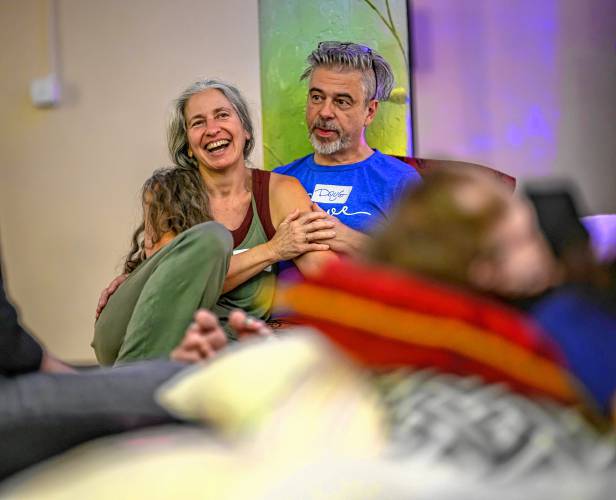
Lorelie Bond and Doug Pouliot, a Cuddle Party facilitator, snuggle together during a gathering in Florence last week. PHOTO BY CHRISTOPHER EVANS
Pouliot comments on the playful, almost childlike vibe. “It’s good that someone became a merperson – that warms my heart,” he says, before segueing into the first rule: Pajamas stay on the whole time. He says he’s acknowledging “the elephant in the room of sexuality,” and that tonight is about platonic touch. (Or not. Rule number two is that you don’t have to touch anyone, ever.) Everyone partners up for an icebreaker designed to practice saying no, which Pouliot demonstrates.
“May I kiss you?” he asks the person next to him. Giggles erupt around the room.
“No,” she says.
“Thank you for taking care of yourself,” he replies, stressing that a “no” isn’t personal, but is essential to interpersonal communication. He turns to the group. “Being able to say no is the key to being able to get close to anyone.”
The in-between
To help me prepare for this particular party, I talked with another Massachusetts-based facilitator who works out of Northampton, Nellie Wilson. “I love that it’s not just about helping to get touch needs met in the workshop, but can really help with getting touch needs met out in the world,” she told me about Cuddle Party. Due to a chronic illness, Wilson has stepped back from hosting parties, but she enjoys “doing one-on-one therapeutic snuggling sessions” with people, primarily clients who are disabled and chronically ill. Prior to the pandemic, it was common for her to work with someone individually on communicating their needs, then direct them to a Cuddle Party to workshop what they’d learned.
(Wilson is a certified Cuddlist and Cuddle Party facilitator. Cuddlist, an organization founded in 2015 to connect cuddle therapists with those seeking healing touch, is separate from Cuddle Party.)
She stressed that Cuddle Parties are laboratories, and that working one’s way to stating or receiving a “no” or “yes” is a process. In a culture that sexualizes touch, it can be hard for anyone to take “cuddling” at face value. At the same time, loneliness is an epidemic, and touch has been proven to reduce anxiety. Teasing all this apart takes time.
For clients who have experienced trauma, Wilson said it is especially important for them to go at their own pace, and introduce touch when they are ready: “We can talk, do breathing exercises together, explore eye gazing, or do an exercise where the person gets to direct me in how close or far away they want me.” At a party, the same autonomy applies. Participants can read, color, spend time at the snack table, or just sit quietly by themselves. Ultimately, the workshop serves as a social container and a healing experience in and of itself, while laying the groundwork for future opportunities for connection.
Open hearts
Back at the Hidden Temple, the group has reviewed the rules and engaged in icebreaking exercises. Congratulations are in order, Pouliot tells them, because they’ve reached the “freestyle” portion of the four-hour evening. Like a lifeguard, he will keep a close eye on things (he even has a red inflatable tube as a handy prop) and, of course, use his interrupting frog at his discretion.
Around the room, cuddlers navigate the waters. One woman dances by herself. One sits alone, approaches a group, and then decides to go solo again. Four people form a “back rub train.” When I ask how they were able to negotiate this, Chris from Amherst says that the consent workshop was a nice way to break the ice, and Claire, visiting from Vermont, agrees: “I don’t think it’s possible to spend too much time on consent. Everyone wants to get to the good parts, but consent is the good part, too.”
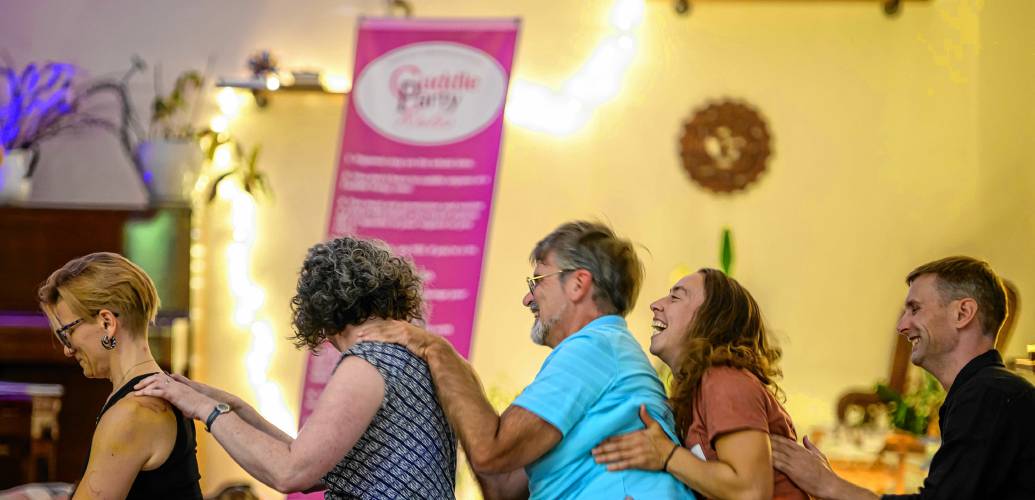
Participants in a “back rub train” during a Cuddle Party in Florence last week. PHOTO BY CHRISTOPHER EVANS
A few feet away, a man and a woman spoon tenderly. The dancer, Ray Beyor, stops to tell me that “movement is a way of reconnecting to yourself – like you’re touching yourself.”
It’s so generous, these glimpses of open-heartedness that I’m let in on. In the corner, Erin from Northampton says that showing up to the party is all that she expects of herself as she chats with an old friend. Pouliot leans against one of the painted columns, stroking his friend Lorelie Bond’s hair, watchful but peaceful.
A spirited threesome commandeers the mermaid tails, lies on their backs, and laughs in unison as they flash their “jazz fins” and choreograph a colorful chorus line. A man kindly offers me his tail, and I’m mesmerized by its shimmer.
If you are interested in cuddling, visit facebook.com/cuddlepartywesternmass.
Melissa Karen Sances lives in western Massachusetts, where she is working on a memoir and writing stories about extraordinary people. Reach her at melissaksances@gmail.com.

